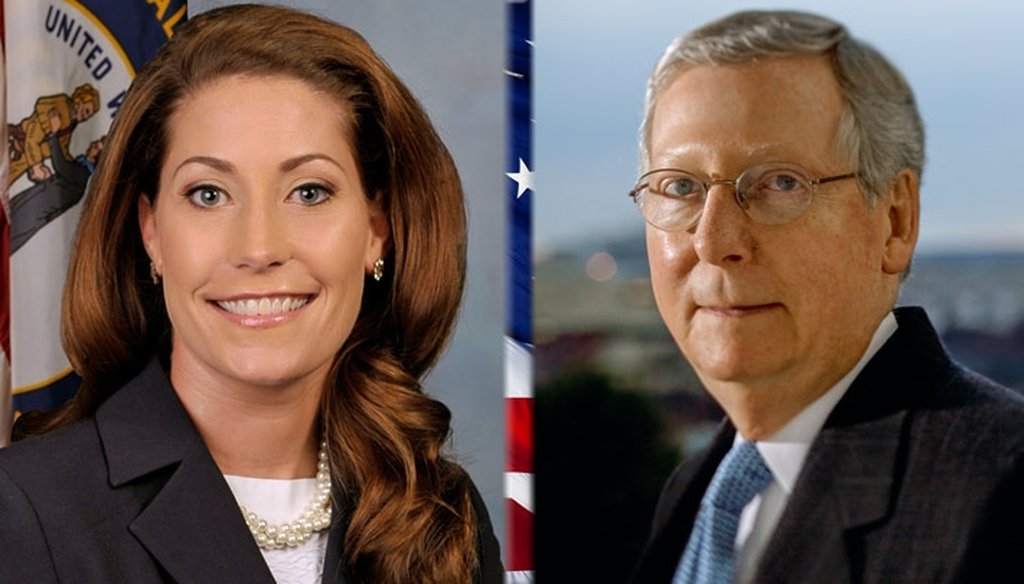Stand up for the facts!
Our only agenda is to publish the truth so you can be an informed participant in democracy.
We need your help.
I would like to contribute

Alison Lundergan Grimes and Mitch McConnell are scheduled to debate Oct. 13, 2014, on Kentucky Educational Television.
Republican Sen. Mitch McConnell and Democratic challenger Alison Lundergan Grimes will meet Monday night in the first — and perhaps only — debate of the Kentucky senate race.
With less than a month to go until Election Day, polls indicate a tight race. McConnell holds a tight but firm four-point lead over Grimes, according to the Real Clear Politics average.
Voters watching the debate on Oct. 13, 2014, will decide whether to send McConnell back to Washington for a sixth term or to elect Grimes and help Democrats maintain control of the upper chamber. The debate can be seen on Kentucky Educational Television and on C-SPAN at 8 p.m. ET.
If the race so far is any indication, McConnell will tout the benefits of having a seasoned veteran representing Kentucky — potentially a majority leader, too, if Republicans pick up enough seats. (See McConnell's PolitiFact scorecard.) Grimes will contend it’s time for a new voice representing the Bluegrass State in Washington. (See Grimes' PolitiFact scorecard.)
Based on the ads we’ve reviewed so far, viewers should also hear plenty about federal carbon regulations (which affects coal) and President Barack Obama’s health care law. Both are national issues with significant local implications; Appalachia coal still powers much of the country and the Affordable Care Act, embraced by Kentucky’s governor, has led to sharp declines in uninsured residents there.
Sign up for PolitiFact texts
Along those lines, we recently checked this claim from a Grimes campaign ad: "The only candidate pocketing big money from people who want to destroy coal is Mitch McConnell." It’s a statement that isn’t accurate.
The Grimes camp asserted in the ad that McConnell and his wife, former Secretary of Labor Elaine Chao, accepted $600,000 from anti-coal organizations. The overwhelming bulk of that sum was earned by Chao from sitting on the board of directors for Wells Fargo, a bank that -- despite some steps to curb its support of mountain-top removal mining -- still maintains $1.8 billion in coal investments, environmental groups say.
Chao also worked for a philanthropic group that gave $50 million to the Sierra Club’s anti-coal campaign. But that was before she arrived and anyway her salary — $9,400 — made up a small chunk of the $600,000.
Grimes also completely ignored her own ties to environmental groups critical of coal. While environmental groups have not jumped into the Kentucky Senate race to back Grimes with the same intensity as they have to help Democrats in states like Colorado and Michigan, there’s enough direct and indirect financial support from anti-coal entities that Grimes’ claim of entirely clean hands is significantly misleading.
We rated the claim False.
It wasn’t the first time the Grimes campaign tried to make an issue of McConnell’s and Chao’s wealth.
One ad (erroneously) claimed that McConnell became a millionaire while in public office.
McConnell’s wealth grew to $22 million since his first term, making him the 10th richest senator in office. But his take-home pay and his private investments made up just a fraction that growth.
So what accounts for the increase in wealth? We found in McConnell's 2008 disclosure forms that he and his wife, former Secretary of Labor Elaine Chao, received a gift of between $5 million and $25 million after Chao’s mother died.
The ad strongly suggested that McConnell somehow managed to leverage his public office into personal riches. We rated this claim Mostly False.
For his part, McConnell has sought to tie Grimes to Obama, who has low approval ratings in the Bluegrass State, and to the Affordable Care Act.
McConnell ran an ad in July claiming that Grimes "supports Obamacare, which cuts $700 billion from seniors’ Medicare."
This is the claim that won’t die. We’ve heard it repeatedly in the 2012 presidential election, and it only tells half the story.
Here’s the rub: the law is projected to reduce spending on Medicare by about $700 billion over 10 years, but those reductions in spending are more of a slowed growth rate rather than a budget cut.
It’s worth noting that the 2012 Republican budget championed by Rep. Paul Ryan, R-Wis., also trimmed future Medicare spending by almost exactly the same amount as the health care law. (And McConnell voted to consider Ryan’s plan in the Senate.) On balance, we rated the claim was Half True.
Also on the health care law, McConnell’s campaign claimed a report released in July showed the "devastating tax hikes (the implementation of the health care law) will have on middle-class Kentuckians," an exaggerated claim.
One section of the lengthy report, released by the Congressional Budget Office in July, discussed the future impact of taxes — including some in the Affordable Care Act. Basically, some federal taxes in the health care law kick in when you reach a certain income level. These levels are not set to increase with inflation. So in 25 years, inflation will push some people past the threshold who, in today’s dollars, would not be required to pay those taxes.
However, we reviewed the analysis and found most of the middle class wouldn’t be affected, even 25 years from now. We rated the claim Mostly False.
For Grimes to top McConnell, she’ll need a strong turnout from female voters. With that in mind, her campaign has consistently criticized McConnell on women’s issue. In one ad, Grimes claimed McConnell voted "two times against the Violence Against Women Act."
However, this painted a limited picture of McConnell’s record on this particular legislation.
McConnell supported the act repeatedly when it was first introduced and when it first passed the Senate in the early 1990s, and twice voted to reauthorize it, including once while Republicans controlled the Senate.
While he voted against the Democratic versions of the bill in 2012 and 2013 that included new provisions for sexual orientation, immigration status and tribal lands (and eventually became law), he also voted for Republican measures that largely maintained the status quo.
We rated Grimes’ claim Half True.
McConnell’s response to this Grimes ad didn’t fair any better on the Truth-O-Meter. He claimed that by backing the Republican versions of the Violence Against Women Act, he "voted for even stronger protections than Obama’s agenda will allow."
The only part of the bill that was "stronger" were new mandatory minimum sentences for domestic abusers, a provision advocates of domestic abuse awareness didn’t even support. And the Republican measure was absent several protections for certain groups — gays and lesbians, illegal immigrants and American Indians — that were included in the bill Obama signed.
We rated McConnell’s statement Mostly False.
The rhetoric and web attacks in the race were also the subject of a segment on comedian John Oliver’s quasi-news program Last Week Tonight. Oliver lamented that this important Senate race could be boiled down to a few talking points, and said, "The people of Kentucky deserve everyone’s sympathy, or at least the one’s with Internet access."
"Here’s an interesting fact: 28 percent of Kentuckians don’t have any online access, a commodity the U.N. had deemed a basic human right," he added.
Oliver is largely right in making his broader point — that when it comes to Internet access or use, Kentuckians tend to lag behind the rest of the country. The state ranks near the bottom in both percentage of people who live on a broadband grid and the number of people with Internet in their homes.
But in crunching the numbers, we found all but 6 percent have access to some Internet (though at very basic speeds). Even though they have access to it, doesn’t mean that are online. Only 72 percent of Kentuckians told U.S. Census surveyors that they actually use the Internet.
We rated the claim Half True.
In about a dozen fact checks of the race so far, the only statement we’ve rated True was an early claim from Grimes that McConnell is "the No. 1 recipient of contributions from lobbyists this cycle." That claim was accurate in March when it was made, but it no longer holds water; McConnell is now fourth in that category.
Our Sources
See individual fact-checks for sources.














































